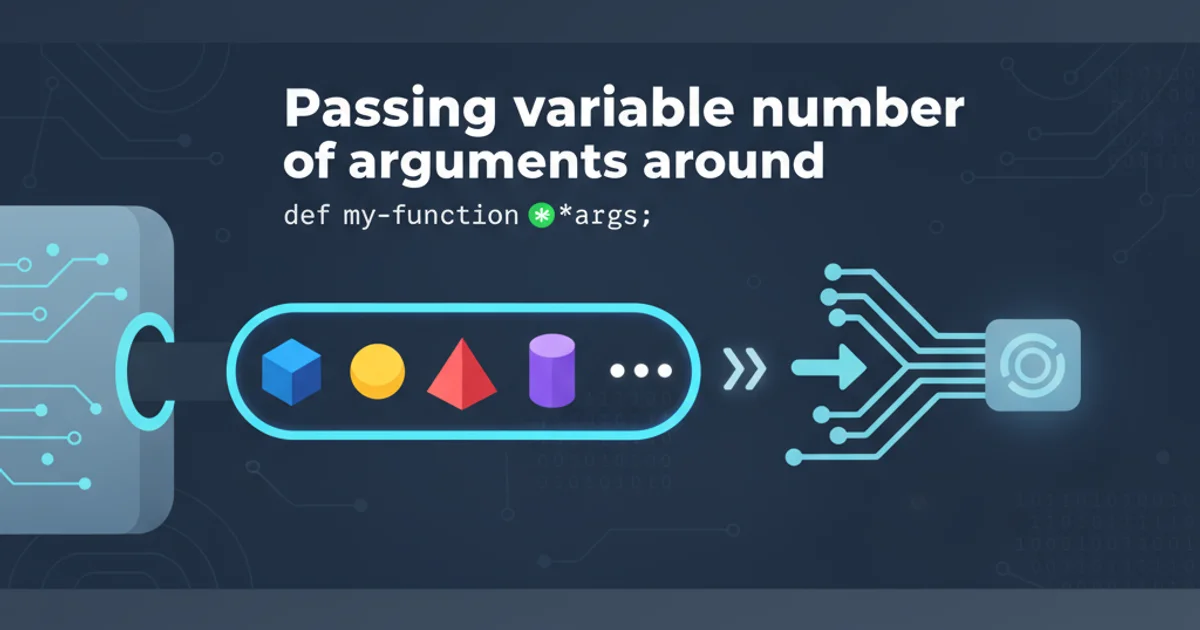Passing variable number of arguments around
Categories:
Mastering Variadic Functions in C: Passing a Variable Number of Arguments

Explore how to implement and use variadic functions in C to handle a flexible number of arguments, enhancing code versatility and reusability.
In C programming, situations often arise where a function needs to accept a variable number of arguments. This capability, known as variadic functions, is crucial for creating flexible and powerful routines like printf, scanf, or custom logging functions. This article delves into the stdarg.h header, explaining how to declare, define, and safely use variadic functions to pass a dynamic number of arguments.
Understanding Variadic Functions
A variadic function is a function that accepts a variable number of arguments. The C standard library provides mechanisms to implement such functions through the <stdarg.h> header. This header defines a type va_list and three macros: va_start, va_arg, and va_end. These tools allow you to traverse the list of arguments passed to the function, retrieve them one by one, and clean up after use.
flowchart TD
A[Function Call] --> B{Fixed Arguments?}
B -- Yes --> C[Process Fixed Args]
B -- No --> D[Variadic Function Declaration]
D --> E["va_start(ap, last_fixed_arg)"]
E --> F{Loop through arguments?}
F -- Yes --> G["va_arg(ap, type)"]
G --> H[Process Argument]
H --> F
F -- No --> I["va_end(ap)"]
I --> J[Return Value]
C --> JFlowchart of a variadic function's argument processing
Declaring and Defining Variadic Functions
To declare a variadic function, you must specify at least one fixed argument, followed by an ellipsis (...). This fixed argument is essential because va_start needs a reference point to locate the beginning of the variable argument list. The fixed argument is typically used to indicate the number or type of subsequent variable arguments.
#include <stdarg.h>
#include <stdio.h>
// Function declaration with ellipsis
int sum_all(int count, ...);
int sum_all(int count, ...) {
va_list args; // Declare a va_list variable
int sum = 0;
int i;
// Initialize va_list to retrieve arguments after 'count'
va_start(args, count);
// Loop through all variable arguments
for (i = 0; i < count; i++) {
// Retrieve the next argument as an int
sum += va_arg(args, int);
}
// Clean up the va_list
va_end(args);
return sum;
}
int main() {
printf("Sum of 3, 5, 7: %d\n", sum_all(3, 3, 5, 7));
printf("Sum of 10, 20: %d\n", sum_all(2, 10, 20));
printf("Sum of 1, 2, 3, 4, 5: %d\n", sum_all(5, 1, 2, 3, 4, 5));
return 0;
}
Example of a variadic function sum_all that sums a variable number of integers.
va_arg. If you try to retrieve an argument with the wrong type, the behavior is undefined and can lead to crashes or incorrect results. The fixed argument often helps determine the types of the variable arguments.Best Practices and Considerations
While powerful, variadic functions come with certain caveats. Type safety is a major concern, as the compiler cannot perform type checking on the variable arguments. It's up to the programmer to ensure that the types retrieved with va_arg match the types actually passed. Common patterns to manage this include:
- Sentinel Value: The last argument is a special value (e.g.,
NULLfor pointers,-1for integers) that signals the end of the argument list. - Count Argument: A fixed argument specifies the total number of variable arguments that follow.
- Format String: Similar to
printf, a format string can dictate the types and order of the variable arguments.
#include <stdarg.h>
#include <stdio.h>
#include <string.h>
// Example using a format string (like printf)
void custom_log(const char *format, ...) {
va_list args;
va_start(args, format);
while (*format != '\0') {
if (*format == '%') {
format++; // Move past '%'
switch (*format) {
case 'd': // Integer
printf("%d", va_arg(args, int));
break;
case 's': // String
printf("%s", va_arg(args, char *));
break;
case 'c': // Character
printf("%c", va_arg(args, int)); // char promotes to int in va_arg
break;
// Add more format specifiers as needed
default:
printf("%%%c", *format); // Print unknown specifier as is
break;
}
} else {
putchar(*format);
}
format++;
}
va_end(args);
putchar('\n'); // Newline for logging
}
int main() {
custom_log("Hello %s, your age is %d and initial is %c", "Alice", 30, 'A');
custom_log("The answer is %d", 42);
custom_log("Just a message.");
return 0;
}
A custom logging function demonstrating the use of a format string for type safety.
char or short types as variable arguments, they undergo default argument promotion to int. Similarly, float promotes to double. Always retrieve these arguments using their promoted types (int for char/short, double for float) with va_arg.